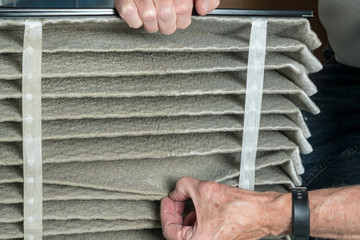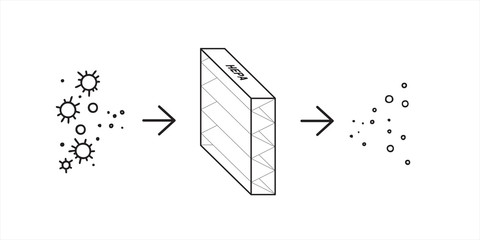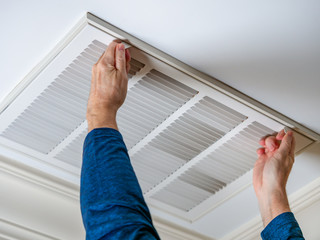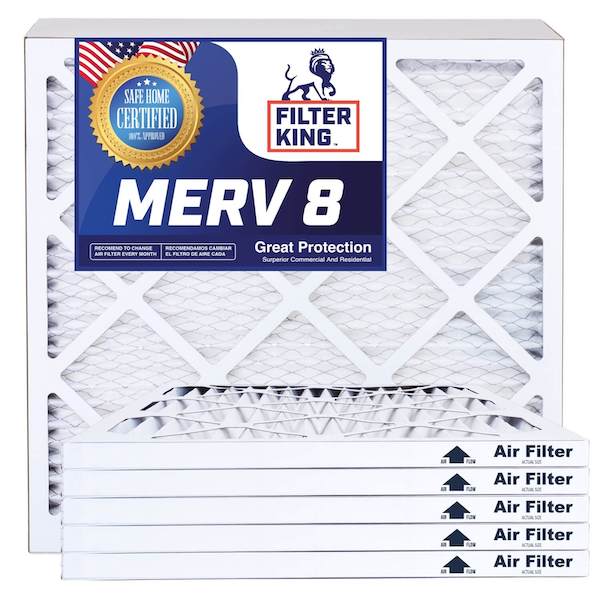Home HVAC Filters 101: Size Comparisons, Types, and Filter Brands
Many homeowners are unaware that they should frequently be cleaning and replacing their HVAC filters. Perhaps you've recently discovered your air filter was caked with dust and pollen, hindering your home's HVAC system airflow, and you rushed to the computer to order new filters. But where do you start? What size do you need? What do all these terms mean, like MERV ratings?
Keep reading for an all-inclusive guide on HVAC air filters that will answer all your questions or watch a short video to learn how air filters work.
What Are HVAC Filters?
HVAC is an acronym that stands for "heating, ventilation, and air conditioning."
An HVAC is a system that provides both heating and cooling to residential and commercial buildings. The ventilation function in an HVAC system uses a furnace filter to clean the indoor air and replaces it with fresh air from the outdoors; this removes anything in the air ranging from smoke, dust, moisture, and undetectable gases that decrease ambient air quality.
How Do HVAC Filters Work?
Home HVAC filters work by drawing in air, which is then warmed or cooled (depending on your thermostat settings) and pushed through ducts that deliver the air to various rooms in your home. The air is cleaned just before your air conditioner pulls it in through a blower and then circulated through the ducts. Any unwanted contaminants are trapped by the furnace filter.
Different Types of HVAC System Filters
There are many different HVAC filter materials, each serving different purposes and offering different benefits.
Electrostatic vs. Regular Air Filters
A regular filter works by capturing airborne particles in the pleated media when your HVAC system pulls in air. An electrostatic filter utilizes static electricity to give contaminants a static charge as they enter the filter. After this charge is released, the particles are trapped.
Electrostatic Filter Pros:
- Usually washable and reusable, which saves money
- Less maintenance
Electrostatic Filter Cons:
- Typically have a very low MERV rating and only capture up to 20% of airborne particles
- Not great for medical use or someone with allergies
Regular Filter Pros:
- Relatively inexpensive
- Some are made from eco-friendly materials
Regular Filter Cons:
- Require more frequent maintenance
- Restrict more airflow into your HVAC systems air handler than a fiberglass filter, putting a strain on your HVAC equipment
Pleated vs. Fiberglass Air Filters
A pleated air filter's media follows a folding pattern, which creates increased surface area, and in turn, allows more air flow while maintaining the quality of air. On the other hand, a fiberglass filter has a minimal surface area, and furnace filters out larger particles like dust and lint and is not very effective.

Pleated Filter Frames Pros:
- Last longer
- Made from biodegradable, sustainable fabric
- Greater surface area for better filtration
Pleated Filter Cons:
- Higher cost than fiberglass, but makes up for it with product lifespan
Fiberglass Filter Pros:
- Allows more air flow
- Lower cost
Fiberglass Filter Cons:
- Poor filtration
- Need to be replaced frequently
- Are not eco-friendly
Disposable vs. Washable Air Filters
Indicative of its name, you can clean a washable furnace filter on a strict maintenance schedule instead of needing to be replaced. Disposable air conditioner filters, alternatively, can be thrown away and replaced every few months.
Disposable Filter Pros:
- Higher costs due to replacement filters schedule
Disposable Filter Cons:
- Less eco-friendly than other filter options
Washable Filter Pros:
- Simple, easy cleaning process
- No need to make multiple purchases
- Eco-friendly
Washable Filter Cons:
- Expensive up-front cost.
- Need to be cleaned on a strict schedule to maintain effectiveness
HEPA-Type Air Filters

A HEPA filter (high-efficiency particulate air) offers one of the highest levels of filtration, with minimum effectiveness of 99.97%. Particles are collected in a HEPA filter through multiple functions, including diffusion, interception, and electrostatic attraction (like rubbing a balloon on your hair).
Pros:
- Extremely effective air filtration
- Some are washable, which reduces replacement costs
Cons:
- It can be expensive to replace
- Cannot trap gases, chemicals, or odors
There are also ductless filters and geothermal filters.
Benefits of Home HVAC Filters

While HVAC filters are considered a home necessity, there is an alarming number of homes without one. There are many benefits to installing and maintaining an HVAC air filter:
Improves indoor air quality by removing harmful air particles like dust, pollen, mold spores, and more. Maintains air moisture
A properly maintained HVAC system filter translates to greater energy efficiency Heats and cools rooms more efficiently
What Is MERV Rating & Why Is It Important?
MERV stands for Minimum Efficiency Reporting Value that's assigned to each furnace filter. It reports the filter's ability to capture particles measuring between 0.3 and 10 microns (µm), based on how tightly woven the filter's weave is. The MERV rating starts at 1 and goes up to 20, with 1 being the minimum filtration level.
While MERV filters with a high rating are more effective in removing airborne particles, they lose their effectiveness quicker than other filters and can also be detrimental to proper HVAC airflow.
1-6 Rating: Best for Industrial Use
A rating between 1 and 6 is best for industrial use. These filters can trap particles such as pollen, dust mites, sanding dust, carpet fibers, and lint.
Scientifically, furnace filters falling between 1-4 MERV ratings are less than 20% efficient at removing air particles. A furnace filter with a rating of 6 is approximately 50% effective.
8-13 Rating: Best for Home Use
The best filter rating that you can use in your home falls between 8 and 13. Examples of controlled contaminants within this range include everything from the 1 to 6 range and legionella, humidifier dust, lead dust, milled flour, and emission fumes.
The effectiveness of air filters within this range improves dramatically, with a rating of 8 providing approximately 85% filtration, a rating of 13 above 90%, and a rating of 11 falling just between the two around 87%.
14-20 Rating: Best for Laboratories and Hospital Use
Lastly, the most intense of air filters fall between MERV rating 14 and 20 on the MERV scale. For that reason, these filters are frequently used in heavily controlled environments such as hospitals, operating rooms, laboratories, and smoking lounges.
Above a MERV rating of 16, you can expect 95% or greater efficiency.
Air Filter Maintenance
Many homeowners assume that filter maintenance includes buying a new filter and replacing their filter every few months, but there are a few things you can do to extend the lifespan of your filter. What Are the Symptoms of a Bad Air Filter?
If you suspect that your furnace filter is malfunctioning, low quality, or needs to be cleaned/replaced, some or all of the following symptoms will be present:
Irritation of the eyes, nose, and throat
- Headaches
- Dizziness
- Fatigue
- Foul odors
Another indicator of a bad filter is a rising electric bill. As a filter loses its effectiveness, it has to work harder to cycle air, which puts more stress on your electrical HVAC system.
How Long Do Air Filters Last?
The length of time that your air filter will last depends on various environmental factors. If the air outside is heavily polluted with contaminants, your furnace filter will need to be changed more frequently to preserve the quality of indoor air. However, an air filter should always be changed at a max every 90 days
Can I Run My AC Without a Filter?
Yes, you can run your Air conditioner unit without an HVAC filter, but it should not be a long-term solution. Doing this for one night in a pinch won't cause any harm, but any period longer than this can risk serious damage and dangerous quality of air.
What MERV Rating Can My HVAC Handle?
Every HVAC system is different. If you're interested in finding out the highest MERV rating that your HVAC can handle, you should read the owner's manual or directly contact the manufacturer.
Can HEPA Filters Be Washed and Reused?
If a HEPA filter is washable or reusable, it will be labeled "permanent" or "washable." Washing a non-reusable HEPA filter can significantly harm the filter's performance.
How Do I Dispose of an Old Filter?
Many air filters are made of recyclable materials, but these need to be separated from the rest of the filter. Many furnace filters can be placed into the garbage.
Choosing The Best Air Filter For Your Home: Know Before Buying
Here are a few factors you should keep in mind while deciding on the best filter for your home.
Price: How Much Can I Expect to Pay?
Like many other aspects of air filters, price is also variable, dependent on various factors such as air filter size. If your HVAC requires a thicker filter then chances are, it's a little bit expensive than other standard filter sizes. Certain HVAC filter sizes, or one that needs to be custom-made, will be significantly more expensive than a smaller, standard air filter.
Expensive air filters are not a luxury but a necessity. They provide a multitude of benefits like keeping your home smelling fresh and maintaining the quality of air.
A cheaper filter, or one that's discounted, maybe the better choice for some households. You should still make sure that any furnace filter you purchase has a suitable rating and offers high-quality performance.
Quality: Does Quality Really Matter?
The short answer is yes. Not all filters are created equal, quality really does matter, especially when purchasing an air filter. In areas with high air pollution, an air filter with quality components may differ between a healthy living environment and an unhealthy one.
MERV Ratings: Which One Should I Use?
The MERV rating you should use depends on various factors such as your location, ambient quality of air, and personal needs.
Air filters with a rating as low as 1 to 4 will do a decent job at filtering out basic dust, but air filters with a rating between 5 and 8 are ideal for most residential homes. These filters are durable and remove many common pollutants from the air.
Situations, where you'll need a filter with a higher rating of MERV, include having a newborn in the house, needing to remove pet dander due to allergies, or any health problem related to breathing.
These health problems can include:
- Asthma
- COPD
- Emphysema
- Chronic bronchitis
- Lung disease
- Weakened immune system
In these cases, you'll want to purchase a filter with a rating of at least 13. The higher rating means that a higher number of air contaminants are filtered out, protecting vulnerable lungs from viruses. If you live in an older home with asbestos, then you may also want to find a filter with a higher rating.
Health: Which Air Filter is Best for Breathing Problems?
If you or a loved one suffer from severe allergies, asthma, or other health problems that affect breathing, then your choice of air filter will be essential to reducing the chance of allergy attacks and dyspnea.
Increasingly severe situations mandate the use of a media filter with a rating of at least 13. A filter with a rating between 8 and 10 is suitable for less severe allergies and health problems. Keep in mind that filters with a higher rating are tightly woven and require scheduling frequent replacement filters, and should be on a strict maintenance schedule to ensure effectiveness.
Frequency: How Often Will I Change the Filter?
Filters from Filter King last up to three months, but there are also general guidelines for changing your filter:
- Change your filter every three months if you live in a home with no pets
- Change your filter every two months if you live in a home with one pet
- Change your filter at least once a month if you have more than one pet
- Change your filter at least once a month or more frequently if anyone suffers from asthma, allergies, or health problems
- Vacation homes or buildings that are rarely used should have their air filters changed every six months
We offer a free filter reminder that will send you a text message and email reminder every time it's time to change your filter. You can also subscribe to our auto shipping service that makes sure an air filter is on your doorstep when you need it to be.
Popular Air Filter Brands
Here is a list of the most popular filter brands on the market, with information straight from Filter King.
Bryant
Bryant filters are some of the most popular and reliable filters available on the market. These filters are reusable and can be washed with cold water, which is great for homeowners on a budget. We offer both air and furnace Bryant filters.
HEIL
HEILl Air Conditioning & Heating produces some of the most durable air filters on the market and gives their customers peace of mind with No Hassle Replacement™ limited warranties on many products.
Amana
If you're looking for an American-based brand with a track record of satisfied customers, then check out Amana.
Ruud
York
York produced the furnace filter used in the first office building with centralized air-conditioning back in 1924.
Lennox
Lennox International is the brainchild and long-lasting remnant of American inventor David Lennox, who designed the first steel-riveted furnace in 1895, paving the way for a new home revolution of heating and filtration.
Rheem
The next honorable mention is Rheem, the largest manufacturer of water heating products in North America.
Trane
If Trane's filters are good enough for the Statue of Liberty, Washington Monument, the La Scala Opera House in Italy, and the Musée d'Orsay in France, then their filters are good enough for your home.
Goodman
Goodman filters are affordable, durable, and come in packs of two, which is great for forgetful homeowners or anyone looking to cut down on their purchase frequency.
Carrier
Carrier is found in more than a million homes and is a reputable, high-quality brand offered by Filter King.
American Standard
Finally, American Standard is a nationally respected and recognized company with phenomenal customer ratings.
Where to Buy an Air Filter?
You can go to buy an air filter in many places, but we recommend signing up with Filter King for consistency and peace of mind with your HVAC filter.
Subscribe to Monthly Delivery With Filter King
At Filter King, we offer a vast selection of premium HVAC air filters that will fit your HVAC system, including top brands like Bryant, Carrier, and American Standard. All of our filters are 100% made in the USA. We'll deliver a filter right to your door with quick, free shipping.
Shop Online
Another option is purchasing HVAC filters online. This is a viable choice, but not all websites will have the filter you need, and the shipping may not be as fast as you need it to be. Websites like Amazon have a large selection of air filters, but not many name brands.
Filter King vs. Home Depot, Walmart, or Lowes
Home Depot , Walmart , and Lowes all offer their own furnace filter subscription services similar to Filter King, with one key difference.
Filter King is the only company out of these four that offers comprehensive customer service and expert help. While the top name brands like Home Depot and Lowes are great distributors of products, they often lack the expertise needed if you need help with your filter. Not to mention, all of our filters are made right here in the United States.
 14x18x1
14x18x1
